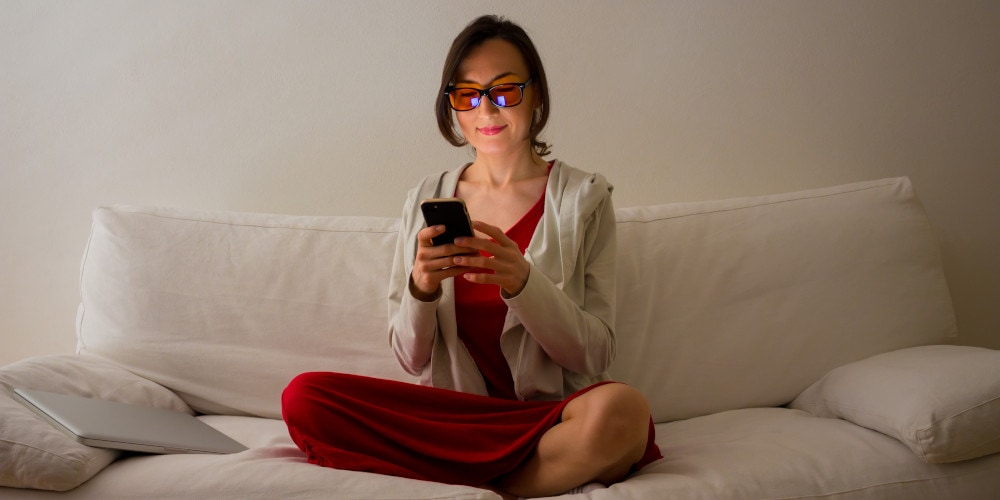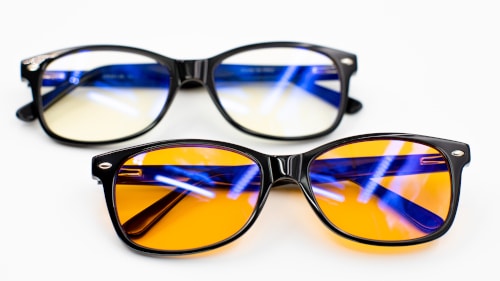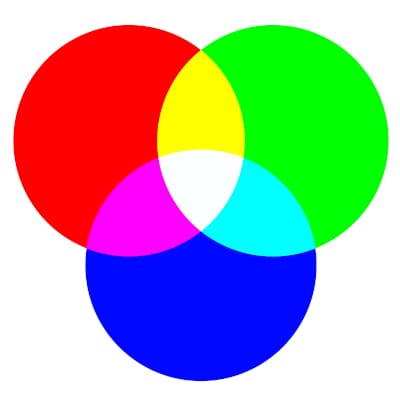If Blueblocking Lenses Are Clear Do They Block Blue Light
Staring into a computer or phone screen has become so second nature that we often forget to consider the impact. The blue light your screen emits can have potentially adverse effects on your eyes, especially if you're on your computer for hours every day.
Enter blue light glasses! Blue light blocker lenses will prevent excess blue light from reaching your eyes, protecting you from digital eye strain and interrupted sleep cycles.
If you've jumped on the trend and picked up blue light filter glasses, you may be wondering: do they work? A blue light glasses test can give you an idea of how much protection you are actually getting from your new eyewear.

Are blue light glasses bad for your eyes?
Blue blocking glasses aren't bad for your eyes, so you can wear them all day without a problem. However, some advertised blue light blockers and blue light computer glasses might not provide as much protection as they claim.
To know for sure how much blue light your eyeglasses block, you'll have to do a test for yourself.
So, do blue light blocker glasses work?
Yes, blue light blocker glasses do work. But to find out if your blue light protection glasses work, there's a simple yet effective test you can do.
While wearing the glasses, look at something you know will have a blue light, like the flashing lights on top of police vehicles or ambulances. If you can't see the blue light flashing, your glasses have an effective blue light filter lens.

However, be aware of the color of your new blue-light-blocking lenses. Glasses with a blue tint make everything look blue, so the blue light won't be noticeable. Computer glasses with clear lenses block about 20% of blue light (depending on manufacturer), which can be enough to limit the harmful effects of blue light. Better blue light blockers have yellow, orange, or amber lenses. Red lenses can block almost the entire blue light spectrum, but can also affect your color vision.
Do blue light filters work?
A blue light filter will remove some amount of blue light, usually about 10-15%. Even the removal of this small amount can be beneficial to anyone who spends long hours at their computer.
A more advanced blue light lens or filter will look amber in color. The amber is what prevents blue light from coming through, so your eyes will have protection from excessive amounts.
Does blue light damage eyes?
Blue is just one of the colors in the spectrum of visible light; the visible spectrum ranges from long-wavelength red light (about 700 nanometers) to short-wavelength violet light (about 380 nm). All light sources – from the sun to a computer screen – give off at least some high-energy blue light. Many of the effects of "harmful blue light" are actually just eye strain from staring at digital screens too long.
When you stare at a specific point for too long, you can forget to blink, and your tear ducts may either dry up or provide too much lubrication; you can get either dry eyes or watery eyes.
Blue light and sleep
The more common issue with overusing screens is the connection between blue light and sleep patterns. The blue light from the sun helps regulate your circadian rhythm, which tells your body when it should sleep and wake up. When you focus on blue light from your screen, this light will disrupt your circadian rhythm, possibly resulting in insomnia and other sleep disorders.
Using a blue light blocking screen protector or pair of blue light glasses can help reduce this risk so you can sleep better.
Blue light blocking glasses benefits
There are many benefits to wearing blue light blocking glasses, including:
- More regular sleep pattern
- Less chance of eye strain
- Less chance of eye diseases
- Fewer migraines
Blue light glasses can also reduce the risk of contracting an eye disease like macular degeneration. Macular degeneration can potentially cause blindness if allowed to progress. Unlike UV light, blue light can reach your retina and potentially cause damage if you're overusing your screen time. Blocking blue light can help keep your retina safe and also potentially reduce the risk of cataracts.
Though blue light doesn't necessarily trigger migraines, the best blue-light-blocking glasses will also reduce brightness. Optometrists usually recommend lenses with an FL-41 tint for people who suffer from light sensitivity. FL-41 glasses are usually rose or amber-colored and will reduce the brightness of your screen to soothe your eyes. The amber tint of these glasses is also the shade that will block out a flashing blue light of a police car, meaning these FL-41 will reduce blue light exposure in addition to light sensitivity.
When to wear blue light glasses?
Blue light is more likely to affect your sleep schedule in the evening or after sundown. Wearing blue light glasses later at night can help prevent your internal clock from thinking it's still daylight.
Wearing blue light glasses during the day will also reduce exposure and lower the risk of eye strain, dry eyes, or other issues.
However, sometimes eye strain is from overusing a digital screen. Take breaks from your computer and try the 20-20-20 test (every 20 minutes, look at something 20 feet away for 20 seconds) to help reduce the strain.

Blue light blocker glasses test
Conducting a blue light glasses test can show whether your blue light glasses work well enough or if they are even necessary. Glasses that block 100% of blue light will not allow you to see the flashing blue light of a police car. Glasses that only block 10-15% might still allow you to see the flash.
Another way to test blue light blockers is with an RGB color wheel. When looking at the color wheel, the blue section should appear black. If the green portion of the wheel is dimmed, then your glasses are also blocking green light – which also disrupts melatonin levels.
Why choose Assil Eye Institute?
At AEI, you will experience state-of-the-art ophthalmology that brings revolutionary technologies together with experienced, board-certified vision care professionals. Our goal is to help you achieve your best possible vision with our eye care.
Please call 866-945-2745 or visit us here to make an appointment online. If you are experiencing any concerning symptoms or require immediate eye care, contact us immediately to determine the best time to schedule an exam.
At Assil Eye Institute we take our patients' safety seriously. Our facility's Covid-19 patient safety procedures exceed all of the CDC's coronavirus pandemic recommendations. Masks are required in our institutes at all times.
We are conveniently located for patients throughout Southern California and the Los Angeles area at locations in or near Beverly Hills, Santa Monica, West Los Angeles, West Hollywood, Culver City, Hollywood, Venice, Marina del Rey, Malibu, Manhattan Beach, and Downtown Los Angeles.
- About
- Latest Posts
![]()
Source: https://assileye.com/blog/blue-light-blocker-glasses-test/#:~:text=Glasses%20with%20a%20blue%20tint,%2C%20orange%2C%20or%20amber%20lenses.
0 Response to "If Blueblocking Lenses Are Clear Do They Block Blue Light"
Enregistrer un commentaire